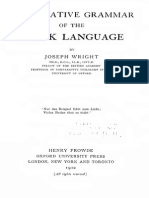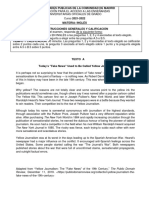ΘΕΜΑΤΑ ΠΑΝΕΛΛΗΝΙΩΝ ΑΓΓΛΙΚΑ 2008
ΘΕΜΑΤΑ ΠΑΝΕΛΛΗΝΙΩΝ ΑΓΓΛΙΚΑ 2008
Uploaded by
ΦΩΤΙΟΣ ΓΟΥΣΙΟΣCopyright:
Available Formats
ΘΕΜΑΤΑ ΠΑΝΕΛΛΗΝΙΩΝ ΑΓΓΛΙΚΑ 2008
ΘΕΜΑΤΑ ΠΑΝΕΛΛΗΝΙΩΝ ΑΓΓΛΙΚΑ 2008
Uploaded by
ΦΩΤΙΟΣ ΓΟΥΣΙΟΣOriginal Description:
Copyright
Available Formats
Share this document
Did you find this document useful?
Is this content inappropriate?
Copyright:
Available Formats
ΘΕΜΑΤΑ ΠΑΝΕΛΛΗΝΙΩΝ ΑΓΓΛΙΚΑ 2008
ΘΕΜΑΤΑ ΠΑΝΕΛΛΗΝΙΩΝ ΑΓΓΛΙΚΑ 2008
Uploaded by
ΦΩΤΙΟΣ ΓΟΥΣΙΟΣCopyright:
Available Formats
AΡΧΗ 1ΗΣ ΣΕΛΙ∆ΑΣ
ΚΕΝΤΡΙΚΗ ΕΠΙΤΡΟΠΗ ΕΙ∆ΙΚΩΝ ΜΑΘΗΜΑΤΩΝ
ΠΑΡΑΣΚΕΥΗ 20 ΙΟΥΝΙΟΥ 2008
ΚΟΙΝΗ ΕΞΕΤΑΣΗ ΟΛΩΝ ΤΩΝ ΥΠΟΨΗΦΙΩΝ
ΣΤΑ ΑΓΓΛΙΚΑ
ΣΥΝΟΛΟ ΣΕΛΙ∆ΩΝ: ΤΡΕΙΣ (3)
Α. Να αποδώσετε στο τετράδιό σας στην ελληνική γλώσσα το
παρακάτω κείμενο, προσδίδοντάς του τη μορφή που θα έπρεπε
να έχει, αν επρόκειτο να δημοσιευθεί σε ελληνικό έντυπο:
Few would deny that media play a central role in the lives of
today’s children and adolescents. Their homes, indeed their
bedrooms, are saturated with media. Many young people
carry miniaturized, portable media with them wherever they
go. They comprise the primary audience for popular music.
They form important audiences for TV, movies, video games
and print media (each of these industries produces extensive
content targeted primarily at kids). They typically are among
the early adopters of personal computers (indeed, of most
new media) and are a primary target of much of the content
of the World Wide Web.
Clearly, attention to the role of media in the lives of children
and adolescents is not new. Plato spoke of the role of
messengers from outside in The Republic, the Brothers
Grimm edited their fairy tales with children in mind, and by
mid-20 th century, social scientists were studying children and
media empirically. Nevertheless, substantial and ongoing
changes in the media environment witnessed in recent years
have led to increased public perceptions that media are
important in young people’s lives and that their role is both
growing and evolving.
(Extract from: Roberts, D.F. Media in the lives of 8-18 year-olds)
(25 points)
media = μέσα ενημέρωσης και ψυχαγωγίας
World Wide Web = διαδίκτυο
The Republic = H Πολιτεία
ΤΕΛΟΣ 1ΗΣ ΑΠΟ 3 ΣΕΛΙ∆ΕΣ
AΡΧΗ 2ΗΣ ΣΕΛΙ∆ΑΣ
Β. Να απαντήσετε στο τετράδιό σας στα αγγλικά στις
παρακάτω ερωτήσεις:
B1.
a. Based on the text, use your own words to explain why
media industries are primarily addressing children. (not
more than 50 words)
(6 points)
b. What do Plato, the Brothers Grimm and social scientists
of the 20 th century have in common, according to the text?
(not more than 30 words)
(4 points)
c. Using your own words, rephrase the following to express
the meaning of the text: “substantial and ongoing changes
in the media environment witnessed in recent years have
led to increased public perceptions that media are
important in young people’s lives”. (not more than 40
words)
(5 points)
B2.
a. Why is there a tendency for new technological products to
become “miniaturized”? (not more than 30 words)
(3 points)
b. Watching TV can be entertaining and educational.
However, educational programmes are not very popular
among young people. Write an email message to the TV
educational programme Director suggesting ways to make
educational programmes more attractive to young people.
Do not write your name at the end of the message. (not
more than 50 words)
(6 points)
c. Discussing the positive and negative effects of video
games on children, a study concluded: “Parents should
recognize that video games can have powerful effects on
children, and should therefore set limits on the amount
and content of games their children play”.
ΤΕΛΟΣ 2ΗΣ ΑΠΟ 3 ΣΕΛΙ∆ΕΣ
AΡΧΗ 3ΗΣ ΣΕΛΙ∆ΑΣ
Drawing on your own experience, write a paragraph for
the Readers Column in your school newspaper. (not more
than 50 words)
(6 points)
Γ. Να γράψετε κείμενο 180 - 200 λέξεων με θέμα:
The editor of your school newspaper has asked you to
write an article commenting on the following statement:
“Encouraging European citizens to learn two foreign
languages should be the basis of the new European Union
language policy”.
Do not write your name at the end of the article.
(45 points)
Ο∆ΗΓΙΕΣ
1. Να δοθούν απαντήσεις σε όλα τα ζητήματα. Κάθε
απάντηση που καλύπτει εννοιολογικά και γλωσσικά τα
ζητήματα είναι αποδεκτή.
2. Τα θέματα και οι οδηγίες θα αναπαραχθούν και θα
διανεμηθούν στους υποψήφιους. ∆εν θα εκφωνηθούν και
δεν θα γραφούν στον πίνακα.
3. Τα θέματα (αγγλικό κείμενο - ερωτήσεις στα αγγλικά -
θέμα «έκθεσης» στα αγγλικά) δεν θα αντιγραφούν στο
τετράδιο.
4. Να μη μεταφραστεί η πηγή του κειμένου.
5. Οι υποψήφιοι θα επιστρέψουν τις φωτοτυπίες των
θεμάτων κατά την αποχώρησή τους στους επιτηρητές, οι
οποίοι και θα τις καταστρέψουν.
6. ∆ιάρκεια εξέτασης: Τρεις (3) ώρες.
Έναρξη χρόνου εξέτασης: Αμέσως μετά τη διανομή των
φωτοτυπιών στους υποψήφιους.
∆υνατότητα αποχώρησης: Μία (1) ώρα μετά την έναρξη
του χρόνου εξέτασης.
7. Η διάρκεια εξέτασης και ο χρόνος δυνατής αποχώρησης
να γραφούν στον πίνακα.
ΚΑΛΗ ΕΠΙΤΥΧΙΑ
ΤΕΛΟΣ ΜΗΝΥΜΑΤΟΣ
ΤΕΛΟΣ 3ΗΣ ΑΠΟ 3 ΣΕΛΙ∆ΕΣ
You might also like
- ELPT Sample Booklet RevisedDocument47 pagesELPT Sample Booklet RevisedIndiraIkaChristie67% (12)
- Ninjacart: The ProblemDocument10 pagesNinjacart: The ProblemAkash Dherange100% (1)
- Microsoft Corporation Organizational Structure Mylaine IndocDocument7 pagesMicrosoft Corporation Organizational Structure Mylaine IndocKIM MARLON GANOBNo ratings yet
- Ecpe ProposalDocument2 pagesEcpe Proposalaserialblogger.comNo ratings yet
- EVAO MADRID JUNE 3 KEY 2023nsoluciones Inglés - MartesDocument8 pagesEVAO MADRID JUNE 3 KEY 2023nsoluciones Inglés - MartesChristina Miren BovillNo ratings yet
- Italian Grammar Notes Level1 A1.1Document24 pagesItalian Grammar Notes Level1 A1.1John tanNo ratings yet
- Sociolinguistic and Pedagogical DimensionsDocument30 pagesSociolinguistic and Pedagogical DimensionsKang AleNo ratings yet
- Yastrebova-Vladykina Uchebnik 2 Kursa PDFDocument366 pagesYastrebova-Vladykina Uchebnik 2 Kursa PDFKarinaNo ratings yet
- LRN - LEVEL 3 CERTIFICATE IN ESOL INTERNATIONAL CEF C2 - LISTENING WRITING READING AND USE - Sample - Paper PDFDocument16 pagesLRN - LEVEL 3 CERTIFICATE IN ESOL INTERNATIONAL CEF C2 - LISTENING WRITING READING AND USE - Sample - Paper PDFΦΩΤΙΟΣ ΓΟΥΣΙΟΣNo ratings yet
- Maslow's Hierarchy How The "House of Cards" CrumblesDocument66 pagesMaslow's Hierarchy How The "House of Cards" Crumblesken jacobsenNo ratings yet
- Mindell: Automation's Finest Hour. Bell Labs and Automatic Control in wwIIDocument8 pagesMindell: Automation's Finest Hour. Bell Labs and Automatic Control in wwIIwatevaid100% (1)
- Solution of Assignment 1Document12 pagesSolution of Assignment 1Md. Mazharul Islam 1935366100% (1)
- SquarepusherDocument2 pagesSquarepusherNiel BezrookoveNo ratings yet
- Module 4 Student's WorksheetsDocument14 pagesModule 4 Student's WorksheetsLaura Antolín del RíoNo ratings yet
- Placement Test I. Complete As Many Questions As You Can and Leave Out The Questions You Do Not UnderstandDocument3 pagesPlacement Test I. Complete As Many Questions As You Can and Leave Out The Questions You Do Not UnderstandXendarNo ratings yet
- Placement Test2022Document13 pagesPlacement Test2022Angélica pérezNo ratings yet
- Apuntes INGLES2 Bach 1 E1617Document80 pagesApuntes INGLES2 Bach 1 E1617Maria Carmen Estevez RodriguezNo ratings yet
- 4C06 Ho Dinh Van A Contrastive Analysis of English and Vietnamese ArticlesDocument14 pages4C06 Ho Dinh Van A Contrastive Analysis of English and Vietnamese Articlesrebecca_he1710No ratings yet
- C Engleza Scris Model Subiect PDFDocument4 pagesC Engleza Scris Model Subiect PDFIonela Loredana BatogNo ratings yet
- Graffiti: Classroom MaterialsDocument5 pagesGraffiti: Classroom MaterialsAnca DianaNo ratings yet
- LanguageCert-PP6-A2-IESOL-EP 99Document15 pagesLanguageCert-PP6-A2-IESOL-EP 99200875103No ratings yet
- Preliminary Michigan 2004 - 2005 Test 1 PDFDocument7 pagesPreliminary Michigan 2004 - 2005 Test 1 PDFGiaaOvkNo ratings yet
- Compito Architettura 2019 enDocument19 pagesCompito Architettura 2019 en0121yuto0121No ratings yet
- Final Test Upper Intermediate B2 - Rui NevesDocument12 pagesFinal Test Upper Intermediate B2 - Rui Nevessandra1975No ratings yet
- Greek Differences PDFDocument2 pagesGreek Differences PDFe2a8dbaeNo ratings yet
- Wright Comparative Grammar of The Greek LanguageDocument406 pagesWright Comparative Grammar of The Greek Languagerabiaqiba100% (1)
- Lista de Miembros de La FAMILIADocument2 pagesLista de Miembros de La FAMILIANallely SanchNo ratings yet
- A Plastic Ocean: A Film Review: Before ReadingDocument3 pagesA Plastic Ocean: A Film Review: Before ReadingSimina EnăchescuNo ratings yet
- Soluciones INGLÉS-Examen Junio 2016 OpcionADocument2 pagesSoluciones INGLÉS-Examen Junio 2016 OpcionAJosune ArévaloNo ratings yet
- Docsity Language To Language by Christopher TaylorDocument35 pagesDocsity Language To Language by Christopher TaylorMariaAntoniettaArpaiaNo ratings yet
- 17.12.19 MK Im LatestDocument45 pages17.12.19 MK Im LatestCapital AdvisorNo ratings yet
- Speakout 2nd Ed Placement TestDocument8 pagesSpeakout 2nd Ed Placement TestLudaNo ratings yet
- ECCE Sample C Key PDFDocument1 pageECCE Sample C Key PDFFernando Andrés Garzón Abadíe100% (1)
- Admission FormDocument1 pageAdmission FormHector AgudeloNo ratings yet
- RephrasingDocument15 pagesRephrasinglonglongfruNo ratings yet
- Diwali Lesson Lesson Plan - 0 PDFDocument3 pagesDiwali Lesson Lesson Plan - 0 PDFmaiaNo ratings yet
- Allegro Einstufungstest EbDocument10 pagesAllegro Einstufungstest Ebsiangelucci2002No ratings yet
- Speakout 2ed Intermediate Plus SB PolcetDocument142 pagesSpeakout 2ed Intermediate Plus SB PolcetLiliana Graciela BerardoNo ratings yet
- Cinema Paradiso EssayDocument6 pagesCinema Paradiso Essayoqmycumpd100% (1)
- Go - Uses and Expressions PDFDocument2 pagesGo - Uses and Expressions PDFJosé Manuel Henríquez GalánNo ratings yet
- Compito Architettura 2017 enDocument19 pagesCompito Architettura 2017 en0121yuto0121No ratings yet
- FJ Turner Frontier Thesis DefinitionDocument6 pagesFJ Turner Frontier Thesis Definitionchristinewhitebillings100% (2)
- Escritora S Hispano American AsDocument97 pagesEscritora S Hispano American AsNes BlumNo ratings yet
- English Exam Fourth BimesterDocument2 pagesEnglish Exam Fourth BimesterMi Su YuNo ratings yet
- Inglés II Examen EXTRA)Document4 pagesInglés II Examen EXTRA)Zugarplum Opheliac AutumnNo ratings yet
- Italian Prepositions - Simple Overview ?? Italiano BelloDocument1 pageItalian Prepositions - Simple Overview ?? Italiano Belloqueenasa fuNo ratings yet
- Use of Pretérito Perfecto and IndefinidoDocument6 pagesUse of Pretérito Perfecto and IndefinidoAnonymous xb3KunxhNNo ratings yet
- PHD Thesis Data Envelopment AnalysisDocument7 pagesPHD Thesis Data Envelopment Analysisbsna8p6k100% (1)
- Genres June 2012withKEY - Παξ-Ω 2017Document9 pagesGenres June 2012withKEY - Παξ-Ω 2017soniaNo ratings yet
- School Leaving Age Set To Rise To 18: (15pts) : A/ Comprehension (7pts)Document18 pagesSchool Leaving Age Set To Rise To 18: (15pts) : A/ Comprehension (7pts)Chekchek ImibashNo ratings yet
- Sainik School Rewari Summer Vacation Homework (2021-22) Class-Xii EnglishDocument4 pagesSainik School Rewari Summer Vacation Homework (2021-22) Class-Xii EnglishVipinNo ratings yet
- PauDocument7 pagesPauj.t.LLNo ratings yet
- ISE III 29 May 2010Document16 pagesISE III 29 May 2010Lídia ValerioNo ratings yet
- Ingles 7 de Junio - 22Document8 pagesIngles 7 de Junio - 22Anonymous Nt5zIrNo ratings yet
- Inglés 7 de JunioDocument8 pagesInglés 7 de JunioAnonymous Nt5zIrNo ratings yet
- Exam XB - 0076 2023 IDocument2 pagesExam XB - 0076 2023 IAlina A.No ratings yet
- Ejercicio Writting EBAU2Document6 pagesEjercicio Writting EBAU2palmiro pachecoNo ratings yet
- Sample Paper 27 Class X Exam 2022-23 English-Language and LiteratureDocument13 pagesSample Paper 27 Class X Exam 2022-23 English-Language and Literaturearya avyuktNo ratings yet
- EbauDocument4 pagesEbauEmily CalvoNo ratings yet
- Final Exam (Oral) : Name - ClassDocument13 pagesFinal Exam (Oral) : Name - ClassRozaNo ratings yet
- BEGE-103 - Exam Paper IGNOUDocument56 pagesBEGE-103 - Exam Paper IGNOUtyke729No ratings yet
- aHSNqU-Examen - Titular-A - INGLÉS ACCESO (Arrastrado)Document1 pageaHSNqU-Examen - Titular-A - INGLÉS ACCESO (Arrastrado)efernadezmunoz06No ratings yet
- Acas Past Questions PDFDocument48 pagesAcas Past Questions PDFmzbnpdkqjmNo ratings yet
- Phil Lett ConvertiDocument5 pagesPhil Lett ConvertiSaadiNo ratings yet
- Scffthool of Creative Arts 1Document5 pagesScffthool of Creative Arts 1aleeahmed8289No ratings yet
- English HL P1 May-June 2023Document12 pagesEnglish HL P1 May-June 2023ndzamelasinoNo ratings yet
- Texto A China Sets Rules For Young GamersDocument4 pagesTexto A China Sets Rules For Young GamersVirginia Ruiz JimenezNo ratings yet
- Natastron 22015003a RevisionDocument39 pagesNatastron 22015003a RevisionΦΩΤΙΟΣ ΓΟΥΣΙΟΣNo ratings yet
- Get To Know You Teacher QuizDocument13 pagesGet To Know You Teacher QuizΦΩΤΙΟΣ ΓΟΥΣΙΟΣNo ratings yet
- Nelly The Small CaterpillarDocument37 pagesNelly The Small CaterpillarΦΩΤΙΟΣ ΓΟΥΣΙΟΣNo ratings yet
- Little Red Riding HoodDocument24 pagesLittle Red Riding HoodΦΩΤΙΟΣ ΓΟΥΣΙΟΣNo ratings yet
- ΘΕΜΑΤΑ ΠΑΝΕΛΛΗΝΙΩΝ ΑΓΓΛΙΚΑ 2007Document3 pagesΘΕΜΑΤΑ ΠΑΝΕΛΛΗΝΙΩΝ ΑΓΓΛΙΚΑ 2007ΦΩΤΙΟΣ ΓΟΥΣΙΟΣNo ratings yet
- Agg Lika 2005Document3 pagesAgg Lika 2005Georgia GiampoylakiNo ratings yet
- ΘΕΜΑΤΑ ΠΑΝΕΛΛΗΝΙΩΝ ΑΓΓΛΙΚΑ 2004Document3 pagesΘΕΜΑΤΑ ΠΑΝΕΛΛΗΝΙΩΝ ΑΓΓΛΙΚΑ 2004ΦΩΤΙΟΣ ΓΟΥΣΙΟΣNo ratings yet
- ΘΕΜΑΤΑ ΠΑΝΕΛΛΗΝΙΩΝ ΑΓΓΛΙΚΑ 2009Document3 pagesΘΕΜΑΤΑ ΠΑΝΕΛΛΗΝΙΩΝ ΑΓΓΛΙΚΑ 2009ΦΩΤΙΟΣ ΓΟΥΣΙΟΣNo ratings yet
- Astronomy For BeginnersDocument163 pagesAstronomy For BeginnersΦΩΤΙΟΣ ΓΟΥΣΙΟΣ100% (4)
- Flashcards For Story Settings and CharactersDocument14 pagesFlashcards For Story Settings and CharactersΦΩΤΙΟΣ ΓΟΥΣΙΟΣNo ratings yet
- DS 34-705-API 670 Machinery Protection SystemsDocument6 pagesDS 34-705-API 670 Machinery Protection SystemsandhucaosNo ratings yet
- Rear Bumper Reinforcement Removal/Installation: 2008 Mazda CX-9 Grand Touring 2008 Mazda CX-9 Grand TouringDocument17 pagesRear Bumper Reinforcement Removal/Installation: 2008 Mazda CX-9 Grand Touring 2008 Mazda CX-9 Grand TouringЯрослав ПіхманецьNo ratings yet
- Assignment 2Document3 pagesAssignment 2hassan6936tNo ratings yet
- Moving On Up.: General Design InformationDocument12 pagesMoving On Up.: General Design InformationGibbs Per100% (1)
- 249th ACS National Meeting & Exposition: DenverDocument301 pages249th ACS National Meeting & Exposition: DenverMichael_Lee_Roberts50% (2)
- Adaptive Delta ModulationDocument15 pagesAdaptive Delta ModulationVinita DahiyaNo ratings yet
- Business Development PresentationDocument19 pagesBusiness Development PresentationJJ Personality100% (2)
- IEC 62561-4-2023Document50 pagesIEC 62561-4-2023acalero1984No ratings yet
- Tender Query ListDocument12 pagesTender Query ListGama Prima MendaNo ratings yet
- Electronic Timer - Series Micon 480: 40MFS0 40AFS0 40SFS0 Cat. NoDocument2 pagesElectronic Timer - Series Micon 480: 40MFS0 40AFS0 40SFS0 Cat. NoTaThachNo ratings yet
- 3Document5 pages3wenny yolandaNo ratings yet
- Saudi Arabian Oil Company: Calculation SheetDocument1 pageSaudi Arabian Oil Company: Calculation SheetJohn BuntalesNo ratings yet
- HVAC Calculation 380kV GIS Bldg. Rev-02Document170 pagesHVAC Calculation 380kV GIS Bldg. Rev-02Mohammed Elmak100% (1)
- Birds Repair PDFDocument13 pagesBirds Repair PDFEl SleskoNo ratings yet
- Child Development Assessment DENVER COMPLETEDocument10 pagesChild Development Assessment DENVER COMPLETEMaura LangeNo ratings yet
- Pioneer Keh-1900 1950 X1m-Es-Uc SMDocument41 pagesPioneer Keh-1900 1950 X1m-Es-Uc SMJosé Ricardo Cedillo JiménezNo ratings yet
- Worksheet 5 - Marketing Environment Domino PDFDocument2 pagesWorksheet 5 - Marketing Environment Domino PDFAdrian DominoNo ratings yet
- Jizi and His Art in Contemporary China - Unification - David Adam Brubaker, Chuchen WangDocument162 pagesJizi and His Art in Contemporary China - Unification - David Adam Brubaker, Chuchen WangMadhuri RaoNo ratings yet
- WEEK 3 Circuits With R, L&C, RC Filters, AC Bridges, Magnetic 4-3Document28 pagesWEEK 3 Circuits With R, L&C, RC Filters, AC Bridges, Magnetic 4-3Lee TalierNo ratings yet
- Python Objects, Types, Classes, and Instances - A GlossaryDocument3 pagesPython Objects, Types, Classes, and Instances - A GlossaryvansanvansanNo ratings yet
- Lab15 ManualDocument16 pagesLab15 ManualgirliepoplollipopNo ratings yet
- AR Manual Sect 4-5Document33 pagesAR Manual Sect 4-5HungNo ratings yet
- 5 Waves AnswersDocument2 pages5 Waves AnswersNoor Ulain NabeelaNo ratings yet
- Chapter IDocument5 pagesChapter IFauziah HaristiaNo ratings yet




































































































